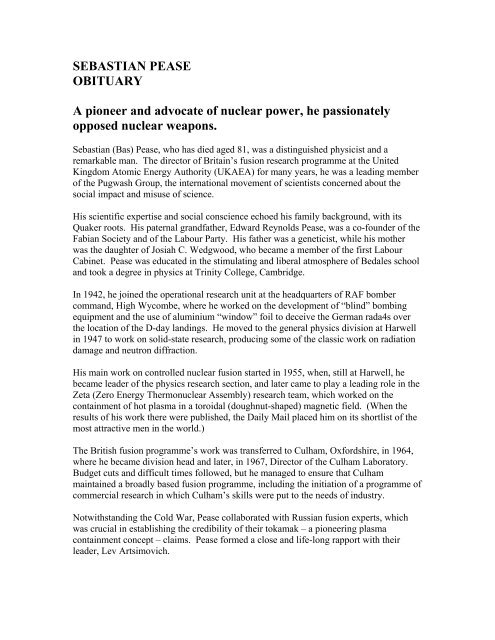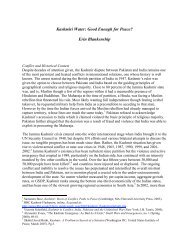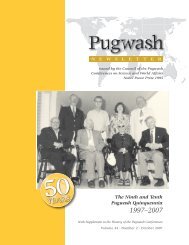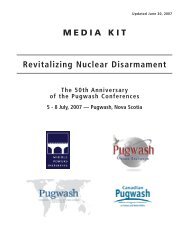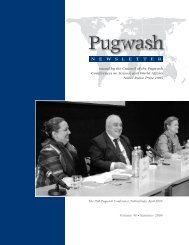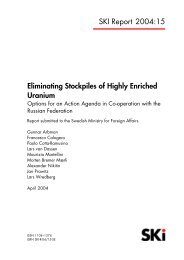Bas Pease - Pugwash Conferences on Science and World Affairs
Bas Pease - Pugwash Conferences on Science and World Affairs
Bas Pease - Pugwash Conferences on Science and World Affairs
You also want an ePaper? Increase the reach of your titles
YUMPU automatically turns print PDFs into web optimized ePapers that Google loves.
SEBASTIAN PEASE<br />
OBITUARY<br />
A pi<strong>on</strong>eer <strong>and</strong> advocate of nuclear power, he passi<strong>on</strong>ately<br />
opposed nuclear weap<strong>on</strong>s.<br />
Sebastian (<str<strong>on</strong>g>Bas</str<strong>on</strong>g>) <str<strong>on</strong>g>Pease</str<strong>on</strong>g>, who has died aged 81, was a distinguished physicist <strong>and</strong> a<br />
remarkable man. The director of Britain’s fusi<strong>on</strong> research programme at the United<br />
Kingdom Atomic Energy Authority (UKAEA) for many years, he was a leading member<br />
of the <str<strong>on</strong>g>Pugwash</str<strong>on</strong>g> Group, the internati<strong>on</strong>al movement of scientists c<strong>on</strong>cerned about the<br />
social impact <strong>and</strong> misuse of science.<br />
His scientific expertise <strong>and</strong> social c<strong>on</strong>science echoed his family background, with its<br />
Quaker roots. His paternal gr<strong>and</strong>father, Edward Reynolds <str<strong>on</strong>g>Pease</str<strong>on</strong>g>, was a co-founder of the<br />
Fabian Society <strong>and</strong> of the Labour Party. His father was a geneticist, while his mother<br />
was the daughter of Josiah C. Wedgwood, who became a member of the first Labour<br />
Cabinet. <str<strong>on</strong>g>Pease</str<strong>on</strong>g> was educated in the stimulating <strong>and</strong> liberal atmosphere of Bedales school<br />
<strong>and</strong> took a degree in physics at Trinity College, Cambridge.<br />
In 1942, he joined the operati<strong>on</strong>al research unit at the headquarters of RAF bomber<br />
comm<strong>and</strong>, High Wycombe, where he worked <strong>on</strong> the development of “blind” bombing<br />
equipment <strong>and</strong> the use of aluminium “window” foil to deceive the German rada4s over<br />
the locati<strong>on</strong> of the D-day l<strong>and</strong>ings. He moved to the general physics divisi<strong>on</strong> at Harwell<br />
in 1947 to work <strong>on</strong> solid-state research, producing some of the classic work <strong>on</strong> radiati<strong>on</strong><br />
damage <strong>and</strong> neutr<strong>on</strong> diffracti<strong>on</strong>.<br />
His main work <strong>on</strong> c<strong>on</strong>trolled nuclear fusi<strong>on</strong> started in 1955, when, still at Harwell, he<br />
became leader of the physics research secti<strong>on</strong>, <strong>and</strong> later came to play a leading role in the<br />
Zeta (Zero Energy Therm<strong>on</strong>uclear Assembly) research team, which worked <strong>on</strong> the<br />
c<strong>on</strong>tainment of hot plasma in a toroidal (doughnut-shaped) magnetic field. (When the<br />
results of his work there were published, the Daily Mail placed him <strong>on</strong> its shortlist of the<br />
most attractive men in the world.)<br />
The British fusi<strong>on</strong> programme’s work was transferred to Culham, Oxfordshire, in 1964,<br />
where he became divisi<strong>on</strong> head <strong>and</strong> later, in 1967, Director of the Culham Laboratory.<br />
Budget cuts <strong>and</strong> difficult times followed, but he managed to ensure that Culham<br />
maintained a broadly based fusi<strong>on</strong> programme, including the initiati<strong>on</strong> of a programme of<br />
commercial research in which Culham’s skills were put to the needs of industry.<br />
Notwithst<strong>and</strong>ing the Cold War, <str<strong>on</strong>g>Pease</str<strong>on</strong>g> collaborated with Russian fusi<strong>on</strong> experts, which<br />
was crucial in establishing the credibility of their tokamak – a pi<strong>on</strong>eering plasma<br />
c<strong>on</strong>tainment c<strong>on</strong>cept – claims. <str<strong>on</strong>g>Pease</str<strong>on</strong>g> formed a close <strong>and</strong> life-l<strong>on</strong>g rapport with their<br />
leader, Lev Artsimovich.
In 1970, he opened a dialogue with Euratom (the European Atomic Energy Community)<br />
<strong>on</strong> British participati<strong>on</strong> in its programme, though Britain was not yet a member of the<br />
European Community. When Britain did join, in 1973, Culham became involved in the<br />
Joint European Torus working group (Jet), <strong>and</strong> <str<strong>on</strong>g>Pease</str<strong>on</strong>g> pushed for the tokamak experiment<br />
to have a more ambitious design objective, to achieve a full-scale dem<strong>on</strong>strati<strong>on</strong> of<br />
therm<strong>on</strong>uclear fusi<strong>on</strong>. He was subsequently involved in a l<strong>on</strong>g political wrangle over the<br />
locati<strong>on</strong> of Jet, <strong>and</strong> deserves much of the credit for the eventual decisi<strong>on</strong> of the EU<br />
council of ministers in 1977 that it should be at Culham.<br />
While Jet remains the world’s leading fusi<strong>on</strong> research apparatus, <str<strong>on</strong>g>Pease</str<strong>on</strong>g> was already<br />
pushing for its successor, Iter (internati<strong>on</strong>al therm<strong>on</strong>uclear experimental reactor), itself<br />
now quagmired in geopolitical debate. He retired in 1988.<br />
His many h<strong>on</strong>ours included electi<strong>on</strong> to the Royal Society in 1977 (he became a council<br />
member <strong>and</strong> vice-president), <strong>and</strong> the award of the Glazebrook medal, the premier award<br />
in Britain for physics, in 1989. However, with his excepti<strong>on</strong>al combinati<strong>on</strong> of l<strong>on</strong>g-range<br />
visi<strong>on</strong> <strong>and</strong> tactical skill, his outst<strong>and</strong>ing c<strong>on</strong>tributi<strong>on</strong> to the British fusi<strong>on</strong> programme was<br />
as a manager of what had become “big science”. In the nuclear debate, <str<strong>on</strong>g>Bas</str<strong>on</strong>g> was a<br />
crossbencher – a str<strong>on</strong>g advocate for the use of nuclear power, but equally opposed to<br />
nuclear weap<strong>on</strong>s. He was a prominent member of the British <str<strong>on</strong>g>Pugwash</str<strong>on</strong>g> Group <strong>and</strong> a<br />
member of its internati<strong>on</strong>al council when the Nobel Peace Prize was awarded jointly to it<br />
<strong>and</strong> its then president, Joseph Rotblat, in 1995. He c<strong>on</strong>tributed to a number of <str<strong>on</strong>g>Pugwash</str<strong>on</strong>g><br />
publicati<strong>on</strong>s, including <strong>on</strong>e giving the case against the replacement of Trident.<br />
<str<strong>on</strong>g>Bas</str<strong>on</strong>g> was very much a family man, His first wife, Susan, had five children, <strong>and</strong> he used to<br />
take the whole family, including gr<strong>and</strong>children <strong>on</strong> holiday – though was sometimes heard<br />
to mutter that “a round of ice cream would set you back.” Accomplished <strong>on</strong> both the<br />
clarinet <strong>and</strong> piano, he played in the Newbury amateur symph<strong>on</strong>y orchestra. He also<br />
loved walking <strong>and</strong> entertaining his friends in his Berkshire home.<br />
After Susan’s death in 1996, he married Jean, whom he had known at Culham. She died<br />
in 2000, <strong>and</strong> he married Eleanor, who survives him al<strong>on</strong>g with his three s<strong>on</strong>s <strong>and</strong> two<br />
daughters.<br />
Robert Hinde <strong>and</strong><br />
Joseph Rotbat<br />
Rendel Sebastian <str<strong>on</strong>g>Pease</str<strong>on</strong>g>, physicist<br />
Born 2 November 1922; died 17 October 2004.


